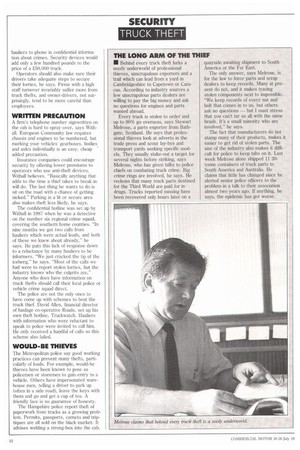SECURITY TRUCK THEFT
Page 54

If you've noticed an error in this article please click here to report it so we can fix it.
hauliers to phone in confidential information about crimes. Security devices would add only a few hundred pounds to the price of a £50,000 truck.
Operators should also make sure their drivers take adequate steps to secure their lorries, he says. Firms with a high staff turnover invariably suffer more from truck thefts, and owner-drivers, not surprisingly, tend to be more careful than employees.
WRITTEN PRECAUTION
A firm's telephone number signwritten on the cab is hard to spray over, says Withall. European Community law requires chassis and engines to be numbered, but marking your vehicles gearboxes, bodies and axles individually is an easy, cheap added precaution.
Insurance companies could encourage security by offering lower premiums to operators who use anti-theft devices, Withal] believes. "Basically anything that adds to the time a thief takes to break in will do. The last thing he wants to do is sit on the road with a chance of getting nicked." Parking in a lit or secure area also makes theft less likely, he says.
The confidential hotline was set up by Withal! in 1987 when he was a detective on the number six regional crime squad, covering the southern home counties. "In nine months we got two calls from hauliers which were actual leads, and both of these we knew about already," he says. He puts this lack of response down to a reluctance by many hauliers to be informers. "We just cracked the tip of the iceberg,'' he says. "Most of the calls we had were to report stolen lorries, but the industry knows who the culprits are," Anyone who does have information on truck thefts should call their local police or vehicle crime squad direct.
The police are not the only ones to have come up with schemes to beat the truck thief. David Allen, financial director of haulage co-operative Roads, set up his own theft hotline, Truckwatch. Hauliers with information who were reluctant to speak to police were invited to call him. He only received a handful of calls so this scheme also failed.
WOULD-BE THIEVES
The Metropolitan police say good working practices can prevent many thefts, particularly of loads. For example, would-be thieves have been known to pose as policemen or storemen to gain entry to a vehicle. Others have impersonated warehouse men, telling a driver to park up (often in a side road), leave the keys with them and go and get a cup of tea. A friendly face is no guarantee of honesty.
The Hampshire police report theft of paperwork from trucks as a growing problem. Permits, passports, carnets and triptiques are all sold on the black market. It advises welding a strong-box into the cab.
THE LONG ARM OF THE THIEF
• Behind every truck theft lurks a seedy underworld of professional thieves, unscrupulous exporters and a trail which can lead from a yard in Cambridgeshire to Capetown or Caracus. According to industry sources a few unscrupulous parts dealers are willing to pay the big money and ask no questions for engines and parts wanted abroad.
Every truck is stolen to order and up to 90% go overseas, says Stewart Melrose, a parts exporter from Bathgate, Scotland. He says that professional thieves look at adverts in the trade press and scour lay-bys and transport yards seeking specific models. They usually stake-out a target for several nights before striking, says Melrose, who has given talks to police chiefs on combating truck crime. Big crime rings are involved, he says. He reckons that many truck parts destined for the Third World are paid for in drugs. Trucks reported missing have been recovered only hours later on a quayside awaiting shipment to South America or the Far East.
The only answer, says Melrose, is for the law to force parts and scrap dealers to keep records. Many at present do not, and it makes tracing stolen components next to impossible. "We keep records of every nut and bolt that comes in to us, but others ask no questions — but I must stress that you can't tar us all with the same brush. It's a small minority who are involved," he says.
The fact that manufacturers do not stamp many of their products, makes it easier to get rid of stolen parts. The size of the industry also makes it difficult for police to keep tabs on it. Last week Melrose alone shipped 11 20tonne containers of truck parts to South America and Australia. He claims that little has changed since he alerted senior police officers to the problem in a talk to their association almost two years ago. If anything, he says, the epidemic has got worse.








































































































































